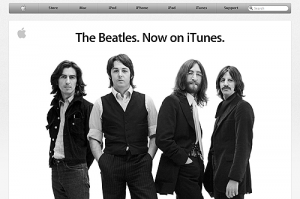Yesterday, Apple (Apple Computer, the company behind my beloved iPhone) changed their homepage to read that on Tuesday November 16th, a big announcement was coming from iTunes. Over the years, Apple has made lots of big announcements but usually they are pretty easy to forecast. For example, around “back to school” season, Apple usually has a music event where they’ll release new iPods and refresh iTunes software. This big announcement, in the middle of November, was not really in keeping with Apple’s usual release cycle. My first thought: The Beatles must be coming to iTunes.

And turns out, I was correct! The Apple.com homepage changed to reveal that The Beatles have officially come to iTunes. The new content available for purchase on iTunes now includes the fab four’s 13 studio albums as well as video content (concerts, commercials, and etc). As a big Beatles fan, I’m really happy to see their catalog added to iTunes; but truthfully, it’s far more important than just making me happy. A lot of folks on the internet (well, in my twitter-verse at least) are making noise about being somewhat disappointed by this announcement. It’s actually a really big deal for The Beatles’ members and their estates, as well as a big deal for Apple Computer. However, it’s a much bigger deal for music history.
You see, right now, we live in an era where folks don’t discover music through the radio. Radio is mostly dead as I knew and loved it. Kids today are discovering music through advertising and placement on television. I can’t tell you how often I’ve heard, “the song from Glee” instead of “Don’t Stop Believin'” by Journey. Clearly, people are learning about music in new ways. The Beatles, in order to maintain their legacy, need to adapt and be available in these new outlets. I’m glad they finally have. The Beatles Rock Band game exposed tons of people to their music. Now, their catalog on iTunes will expose more of the younger generation to their music.
This deal sets a precedent. That at the end of the day, old media MUST adapt if they want to continue to have some relevancy. Times change and, if you don’t want to be forgotten (and make some extra money, to boot), you need to change too.
